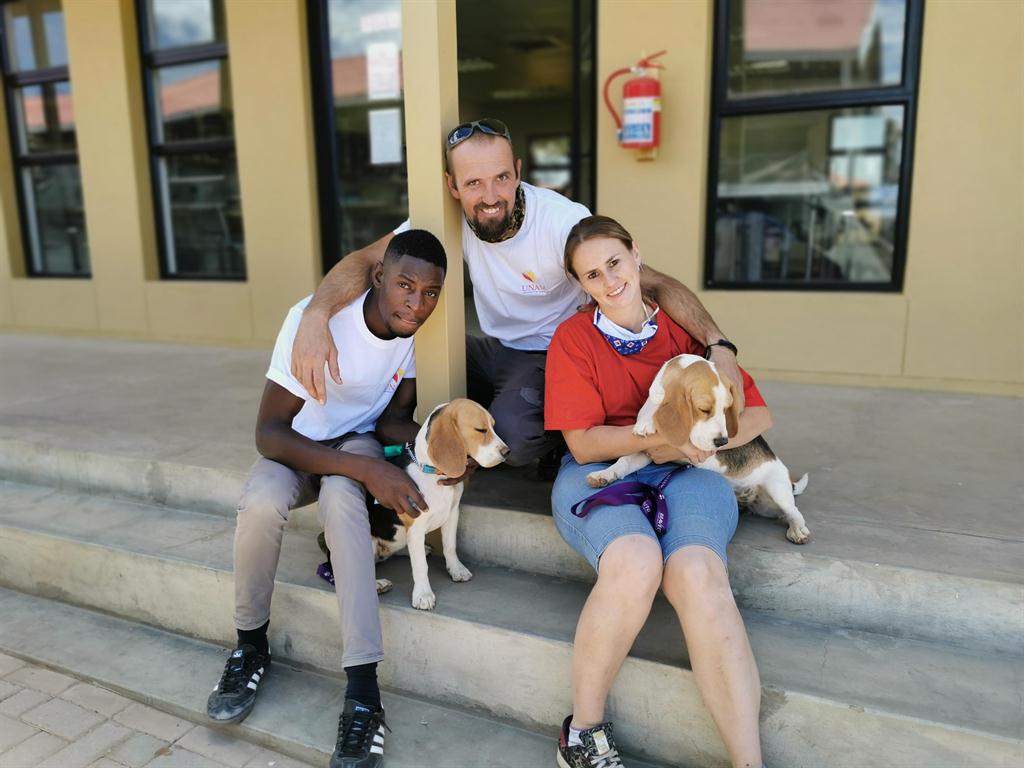A man’s best friend
Capricorn Group supports the COVID-19 Detection Dogs pilot project
Staff reporterThe University of Namibia School of Veterinary Medicine recently embarked on a non-invasive pilot project, supported by the Ministry of Health, to train and deploy COVID-19 detection dogs.
The dogs will assist in a unique way with the health, safety and recovery of Namibia’s economy. Capricorn Group, who has already donated N$5 million against the fight of COVID-19 during 2020, has committed a further N$ 80 000 to support this unique pilot project.
‘‘Capricorn Group, as connectors of positive change, is excited to be part of such an exciting project in collaboration with public and private institutions. The pilot project is the first of its kind in Africa. This initiative is a significant stride for Namibia and if successful, can make a significant contribution in the country’s fight against the COVID-19 pandemic: said Marlize Horn, Capricorn Group’s Executive Officer: Brand & Corporate Affairs.
Situated near the Hosea Kutako International Airport in Windhoek, the skills within the University of Namibia’s School of Veterinary Medicine (SoVM) is harnessed to train dogs to screen travellers and Namibians for COVID-19 in identified spaces such as airports, schools, harbours, sporting events and large gatherings.
The procedure consists of an underarm swap to gather moisture exuded through the pores of the skin. The dogs then sniff the samples, and so far they have never had a false negative. 98% of the selected positive samples have been COVID-19 positive.
Currently, dog trainers and handlers have successfully trained four Beagles named Beauty, Bat, Amy and Adam, who have proven themselves capable of doing the job.
These dogs can be considered true heroes in the fight against COVID-19. Symptoms can take days to develop, and many asymptomatic cases can spread the virus unknowingly. Still, this project can evolve into a fast and effective way to detect and isolate infected people, which will further curb the spread of the virus into communities.
Dr Conrad Brain, UNAM SoVM in collaboration with Lady Pohamba Private Hospital, and esteemed medical professionals, Salomo Amadhila and Dr Laura Brandt, coordinates the collection of samples. Dr Brain says that they have already achieved great strides with this method and believe they are just scratching the surface of the capabilities of these dogs.
‘‘ The dogs have learned to identify the molecular level of the samples, and that is fantastic. We are using Beagles as the preferred breed for now, because they come across as less intimidating to the public. In the future, we want to start training dogs from the SPCA. The radius for the smell of all dogs is approximately 1.5 metre. Therefore, all breeds should be able to do this“, Dr Conrad Brain said.
Dr Brain also elaborated that dogs noses are excellent since their scent detection is 100 or more times better than those of humans. A well-trained dog can smell up to 30 to 40 different kinds of scents. They train the dogs through positive reinforcements three times a week for 4-5 hours collectively.
The four-legged furry friends are also able to smell 17 people in less than 2 minutes which can contribute to overall cost-cutting for COVID testing since one dog, and its handler equals four police officers, a doctor and more people needed test for the virus.
The contribution from Capricorn Group towards the project will enable more dogs to be trained, and also ensure they are well-taken care off with top of the range nutrition food that will support them throughout the project and on their off times.
Lady Pohamba Private hospital helps the project with the evaluation of the samples. The team from The University of Namibia School of Veterinary Medicine is very grateful for the support and equipment from both the Government and other universities.




Comments
My Zone
No comments have been left on this article